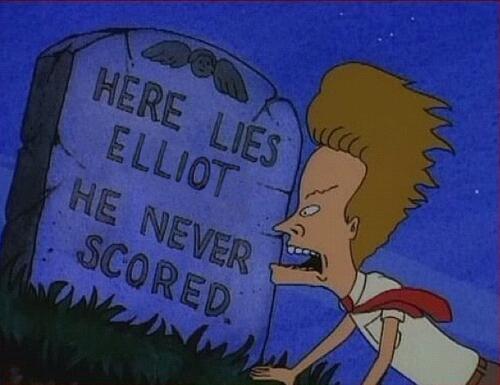 I am confused about some things. If you know the answers to these, please don’t hesitate to not email me.
I am confused about some things. If you know the answers to these, please don’t hesitate to not email me.
– The audience in the Producers paid to see a movie called “Springtime for Hitler”…so why are they shocked that it has Nazis in it?
– Why do we say “a ton of something” to indicate a large number? Doesn’t that depend on what you’re talking about? A ton of horses is only two or three horses. A ton of pianos is…one piano. A ton of blue whales would be part of a whale flipper or something.
– Why is QWERTY a universally recognised series of letters, and so is ASDF (to an extent)…but nobody ever talks about ZXCV?
– Why do we still have a cliche of rappers wearing furs, diamond grills, and gold chains?
This hasn’t been true for a decade. Most rappers today (Kanye, Drake, Jay Z) dress in a pretty understated and subdued way – t-shirts, hoodies, wifebeaters, suits if they’re going to an awards show. It’s like if women evolve the ability to excrete through a throat sac and we all still joked about them leaving the toilet seat down.
– Everyone makes fun of Han Solo’s “12 parsec” goof in A New Hope, but isn’t it a powerful argument for the Millenium Falcon’s abilities that a scientific illiterate can fly it?
– Why can ghosts walk right through walls but not fall through floors?
– If a superhero is a powerful hero, why don’t we call a heroic disabled people “subheroes”?
– When Howard Stern described himself as “the king of all media”, did he do this in knowledge that, like monarchy, talk radio would eventually become obsolete? A forward thinking businessman would have called himself the prime minister or president of all media.
– Why are the hundreds of Nigerian princes in my inbox not causing massive hyperinflation? And why do they advertise “free money”, when they know full well that their millions of dollars will introduce nothing but stress and unneeded complexity to my life?
 Most of the reporting on this is terrible, sourced from tweets and suchlike. Here’s a good article on what went down, why it was probably inevitable, and what the ramifications are for the Australian music business.
Most of the reporting on this is terrible, sourced from tweets and suchlike. Here’s a good article on what went down, why it was probably inevitable, and what the ramifications are for the Australian music business.
Some observations.
1. Past iterations of Soundwave actually had good lineups, but this one didn’t.
This year, you got to pay $170 to listen to various washed up British hardcore bands, even more washed up American nu metal bands, plus Frenzal Rhomb. They’re a huge draw, I guess…?
AJ Maddah claims on Twitter that he nearly wrangled a RATM reunion, and that would have been something. Like a lot of his management, it seems SW16’s success depended on all the stars aligning.
Look, if only mediocre bands want to play your festival, that’s fine – but you have to adjust the ticket price downwards. SW16’s ticket sales sucked because the bill just wasn’t worth it. Nobody wants to pay $170 to see Disturbed. They are not headliner material for a show of this magnitude.
Going over to Europe, you can see Manowar screw up their own effort at a festival with the same mistake. Magic Circle Festival 2007 cost €10. Everyone and their evil twin attended. Magic Circle Festival 2008 cost €80, but they had a great lineup and a once in a lifetime opportunity to see Manowar play their first six albums back to back (the show lasted over three continuous hours). Magic Circle Festivals 2009 and 2010 had nothing special going for it, no good bands except Manowar…and it cost €75. The value had gone, but the price stayed the same.
There was no Magic Circle Festival 2011.
2. Maddah’s doing the same thing everyone does.
That is, robbing Peter to pay Paul and trying to cover old debts with a slew of fresh debts. This isn’t uncommon in finance. Lots of successful companies work this way. Just keep ballooning upwards on an ever-increasing pile of debt, and you’ll look like you’re a rising star. The trouble is, eventually things contract, and then you’re not able to pay people.
Read the article, especially the part about various contractors and freelancers persuing unpaid debts related to SW and Maddah. These are guys who had gotten burned and were consequently pretty unwilling to extend credit to SW, thus putting a spoke in his wheel. While SW was looking like a success from the outside, the foundation was already crumbling.
And then there’s the unpaid talent. That’s really bad. These bands all talk to each other, you know? It’s hinted between the lines that Maddah had trouble wrangling with acts like Bring Me the Horizon because they knew his habit of writing rubber cheques.
And these were the bands Maddah counted on to recoup the losses of 2014 and 2015, keeping the next stage of the game going.
3. We should put some R&D money into more bands like Compressorhead.
Seriously, no more flakey musicians and drug overdoses and reunions that fall through. Although, like RATM, they seem to be having singer problems.
 I miss PUAHate. Its denizens used to drive me up the wall with their stupidity…but they brought something to my life I can’t live without. Their raw, naked patheticness. Their willingness to air laundry that wasn’t just dirty, but irradiated and coated in sarin gas. When you get the lowest of the low together, nobody has anything to hide, and all the walls come down. The site’s radical honesty felt incredible, like mother’s milk, except PUAHate was the complete opposite of having a woman’s nipples in your mouth.
I miss PUAHate. Its denizens used to drive me up the wall with their stupidity…but they brought something to my life I can’t live without. Their raw, naked patheticness. Their willingness to air laundry that wasn’t just dirty, but irradiated and coated in sarin gas. When you get the lowest of the low together, nobody has anything to hide, and all the walls come down. The site’s radical honesty felt incredible, like mother’s milk, except PUAHate was the complete opposite of having a woman’s nipples in your mouth.
PUAHate was too good to last. One permavirgin on a shooting spree later, and the site is one with the dust of Tyre and Sidon. Why should we pay for one dipshit’s mistakes? Its like the real life version of this Onion article. I want to hunt former webmaster Nicholaus down and demand satisfaction.
Anyway, the grieving and mourning process has ended, and I am ready to find a replacement for PUAHate. But where? What sites allow you to admire the very worst humanity has to offer?
1. Reality Television
No deal. Reality TV is so obviously set up and manipulated that it’s not even clever to joke about it any more. Even the shows that aren’t outright staged have an ambience of fake-looking TVness that locks me out of the show. The camera angles, the lighting, it’s too clean, and too professional. It’s cinema verite with the verite left on the cutting room floor. Modern reality TV is like a petting zoo where you touch the animals through a thick layer of polythene.
I do enjoy the little moments that show the reality behind the facade.
Here’s an example: someone from Jersey Shore mentioned in an interview that all the housemates take huge, hour-long showers. Why? Because the bathrooms were the only place in the building free of the prying eyes of the camera. They were trapped inside a panopticon. That’s a turn-on. That’s reality TV. Someone should make a reality TV show that capitalises on that. Where the contestants are told they’re filming a documentary or something…but it’s actually private footage from their bedrooms and bathrooms that gets put on air. That would be exciting.
Until then, I don’t think it’s possible for reality TV to be less interesting.
2. Reddit’s /r/cringe related boards.
The concept is simple. Minor social missteps, captured in film and image for all eternity. This man, crossing the street too early. This man, who left his flash on. This man, who won a contest to lose his virginity to a porn star. Yes, cringers are almost always male.
These places are great but they’re missing another important element: running storylines. In PUAHate you’d get to watch people change over time. Aexexx went from advocating “LMS Theory” (that is, your value to women is determined by your Looks, your Money, and your Status), to a more hardline “FACE Theory” (that is, Face and Age Conquer Everything – your value to women is determined by your facial attractiveness and you not being too much older than her). You’d see Pokerface abandoning his attempts at being a poker pro, descending into a morass of depression, and returning occasionally to threaten suicide. All this cringe stuff has names blurred out, and everything is censored and anonymous. It’s like a sketch variety show vs a soap opera. Good for what it is, but it’s not the same.
3. 4chan, 8chan, whateverchan
Similar problem to the above. People just come and go. Everyone’s anonymous. No “characters”.
4. Remnants of PUAHate
The thing I miss about the old-school web is that pages tended to stay around longer. You could find a website that hadn’t been updated in years, and as long as someone was paying the web hosting bill, it would still work. Even if someone consciously deleted stuff, you could usually find a few bits and pieces (remember browsing someone’s FTP tables after their index page was deleted?)
Now, everything’s driven by PHP databases, and when something breaks, EVERYTHING vanishes into the void. When websites are down, they really are down. Deleting fucking everything has never been easier. Thousands of records can be erased with a few mouse clicks, or by sheer accident. And don’t get my started on that Bobby Tables douchebag.
PUAHate comes from the later era, so 99.9% of the site was swallowed by Nicholaus’s frantic attempts to avoid incrimination and stay out of jail. But you can still find bits and pieces – the website was too bizarre and surreal to not leave a mark on the internet.
PUAHaters were obsessed with male pattern baldness, and you could often find them slinging obscure bits of theory on MPD support forums. Here’s one. PUAHate legend Chinpoko apparently liked to hang out on these websites, and was often banned for traumatising men with his auguries of doom for their sex lives.
Bodybuilding.com was another of their benighted haunts. I note that the word “PUAHate” gets asterisked out when you type it there, something that usually happens only under extreme circumstances (come to think of it, I believe Elliot Rodger posted on BB.com as well).
But perhaps the best legacy of PUAHate is contained in Elliot Rodger’s own memoir (of sorts), My Twisted World. Inside it you will find the entire ethos of the site, bar one important thing: he decided to do something about it.
“I soon found out the name of the beautiful girl in my math class. Her name was Brittany Story. Being the obsessed stalker that I was, I looked her up on Facebook, and what I found shattered my already wounded heart to pieces. She had a boyfriend. Not only that, but her boyfriend was the type of boy I have always hated and despised: a tall, muscular surfer-jock with a buzz cut. As I looked at all the pictures of the two of them together, I shivered with pure hatred. I could physically feel the hatred burn through my entire body. I wanted to kill both of them, and I was capable of doing it. Brittany Story should have been mine, and if can’t have her, no one should! I fantasized about capturing the two of them and stripping the skin off her boyfriend’s flesh while making her watch. Why must my life be so full of torment and hatred? I questioned to the universe with turmoil roiling inside me. I screamed and cried with anguish that day. My housemate Spencer heard it all, but I didn’t care.”
 I am confused about some things. If you know the answers to these, please don’t hesitate to not email me.
I am confused about some things. If you know the answers to these, please don’t hesitate to not email me.

